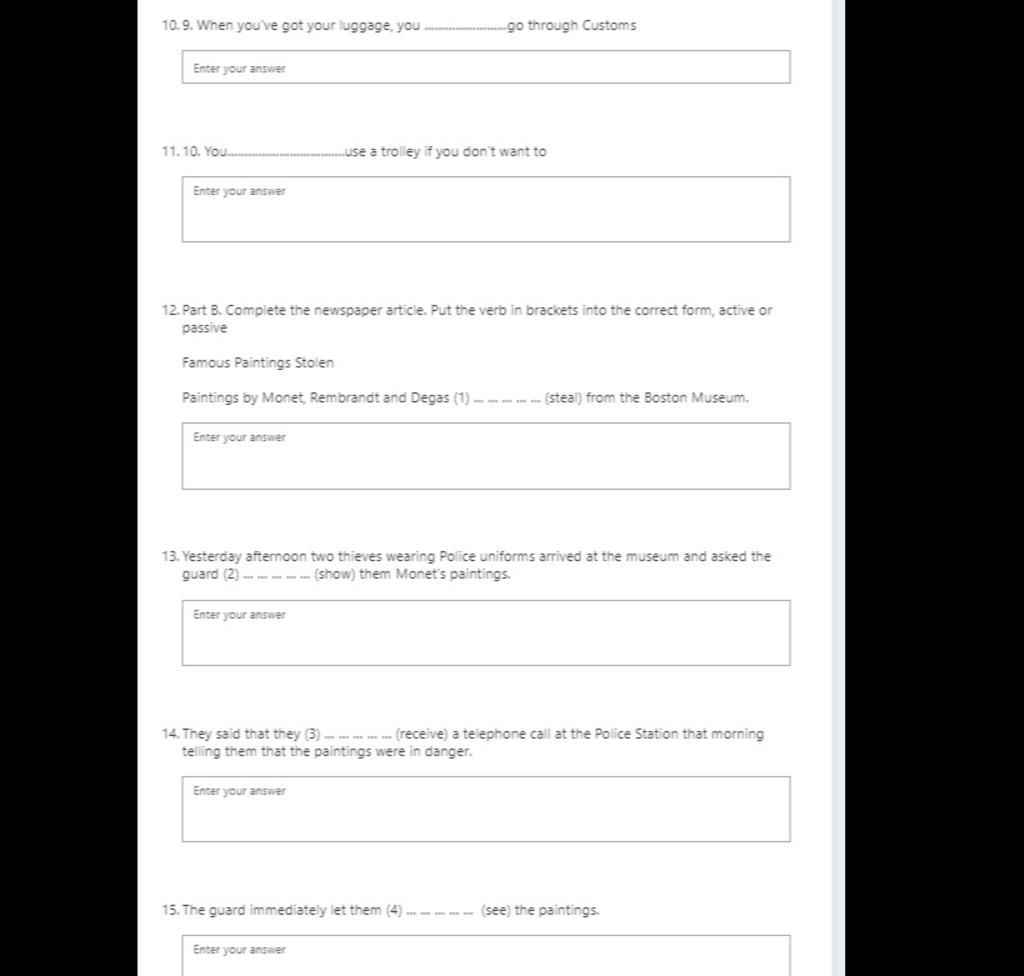
Những câu hỏi liên quan
Bài 2: Dựa vào những từ cho sẵn, viết câu hoàn chỉnh với “should” hoặc “shouldn’t”.You/ go/ to/ see/ doctor/ regularly. …………………………………………………………………………Which dress/ I/ wear/ today? …………………………………………………………………………The teacher/ think/ Jim/ study/ harder. …………………………………………………………………………The boys/ not/ climb up/ the wall. …………………………………………………………………………I/ watch TV/ go out/ with/ friends/...
Đọc tiếp
Bài 2: Dựa vào những từ cho sẵn, viết câu hoàn chỉnh với “should” hoặc “shouldn’t”.
You/ go/ to/ see/ doctor/ regularly. …………………………………………………………………………
Which dress/ I/ wear/ today? …………………………………………………………………………
The teacher/ think/ Jim/ study/ harder. …………………………………………………………………………
The boys/ not/ climb up/ the wall. …………………………………………………………………………
I/ watch TV/ go out/ with/ friends/ now? ………………………………………………………………………...
If/ Jim/ be/ sick, he/ stay/ home. …………………………………………………………………………
How much/ water/ we/ drink/ everyday? …………………………………………………………………………
What/ I/ not/ do/ at/ Chinese restaurant? ………………………………………………………………………….
You/ inform/ your parents/ before/ you/ go. …………………………………………………………………………..
Josh/ not/ devote/ all/ his free time/ to/ playing/ games. ……………………………………………………………………………
Bài 2: Dựa vào những từ cho sẵn, viết câu hoàn chỉnh với “should” hoặc “shouldn’t”.
You/ go/ to/ see/ doctor/ regularly.
-> You should go to see the doctor regularly.
Which dress/ I/ wear/ today?
-> Which dress should I wear today?
The teacher/ think/ Jim/ study/ harder.
-> The teacher thinks Jim should study harder.
The boys/ not/ climb up/ the wall.
-> They boys shouldn't climb up the wall.
I/ watch TV/ go out/ with/ friends/ now?
-> Should I watch TV or go out with my friends now?
If/ Jim/ be/ sick, he/ stay/ home.
-> If Jim is sick, he should stay at home.
How much/ water/ we/ drink/ everyday?
-> How much water should we drink everyday?
What/ I/ not/ do/ at/ Chinese restaurant?
-> What shouldn't I do at Chinese restaurant?
You/ inform/ your parents/ before/ you/ go.
-> You should inform to your parents before you go.
Josh/ not/ devote/ all/ his free time/ to/ playing/ games.
-> Josh shouldn't devote all his free time to playing games.
Đúng 2
Bình luận (0)
Write the second sentence, using should or shouldn’t and the words given.
You are always late for school. (you/ be/ punctual)
_________________________________________
You are always late for school. You should be punctual.
Đúng 1
Bình luận (0)
You are always late for school. You should be punctual.
Đúng 0
Bình luận (0)
2. Complete the sentences with must, mustn’t, should or shouldn’t. (Hoàn thành các câu với must, mustn’t, should, shouldn’t.)You should read this information as soon as youarrive at the sports centre.(Bạn nên đọc thông tin này ngay khi đến trung tâm thể thao.)1. All visitors follow the rules at the sportscentre. This is very imporfant.2. You bring expensive watches or jewellery to the sports centre. It isn’t a good idea.3. In the swimming pool, parents watch their children at all times. This is...
Đọc tiếp
2. Complete the sentences with must, mustn’t, should or shouldn’t.
(Hoàn thành các câu với must, mustn’t, should, shouldn’t.)
You should read this information as soon as youarrive at the sports centre.
(Bạn nên đọc thông tin này ngay khi đến trung tâm thể thao.)
1. All visitors follow the rules at the sportscentre. This is very imporfant.
2. You bring expensive watches or jewellery to the sports centre. It isn’t a good idea.
3. In the swimming pool, parents watch their children at all times. This is an important rule.
4. You run near the swimming pool. This is forbidden.
5. You walk or cycle to the sports centre if possible, because the car park isn’t very big.
6. Children under the age of 12 come to the sports centre without an adult. This is against the rules.
7. Visitors look at the information about our cheaper tickets in the holidays.
8. The sports centre doors always close at 7:00. Everybody leave by this time.
1 All visitors must follow the rules at the sportscentre. This is very important.
(Tất cả du khách phải tuân theo các quy định tại trung tâm thể thao. Điều này là rất quan trọng.)
Giải thích: ‘the rules at sports centre’ là những điều luật bắt buộc phải tuân theo → must
2 You shouldn’t bring expensive watches or jewelry to the sports centre. It isn’t a good idea.
(Bạn không nên mang đồng hồ hoặc đồ trang sức đắt tiền đến trung tâm thể thao. Đó không phải là một ý kiến hay.)
Giải thích: là câu mang tính khuyên không nên làm gì, không mang tính bắt buộc → shouldn’t
3 In the swimming pool, parents must watch their children at all times. This is an important rule.
(Trong bể bơi, cha mẹ phải quan sát con cái của họ mọi lúc. Đây là một quy tắc quan trọng.)
Giải thích: ‘this is an important rule’ đây là điều luật bắt buộc phải tuân theo → must
4 You mustn’t run near the swimming pool. This is forbidden.
(Bạn không được chạy gần hồ bơi. Điều này bị cấm.)
Giải thích: ‘this is forbiden’ đây là hành động bị cấm làm, không được làm → mustn’t
5 You should walk or cycle to the sports centre if possible, because the car park isn’t very big.
(Bạn nên đi bộ hoặc đạp xe đến trung tâm thể thao nếu có thể, vì bãi đậu xe không lớn lắm.)
Giải thích: là câu mang tính khuyên nên làm gì, không mang tính bắt buộc → should
6 Children under the age of 12 mustn’t come to the sports centre without an adult. This is against the rules.
(Trẻ em dưới 12 tuổi không được đến trung tâm thể thao mà không có người lớn. Điều này là trái với các quy tắc.)
Giải thích: ‘this is against the rules’ đây là hành động không được làm, chống lại các luật lệ→ mustn’t
7 Visitors should look at the information about our cheaper tickets in the holidays.
(Du khách nên xem thông tin về vé rẻ hơn của chúng tôi trong những ngày lễ.)
Giải thích: là câu mang tính khuyên nên làm gì, không mang tính bắt buộc → should
8 The sports centre doors always close at 7:00. Everybody must leave by this time.
(Cửa trung tâm thể thao luôn đóng lúc 7:00. Mọi người phải rời đi vào lúc này.)
Giải thích: đây là điều mang tính tần suất cao nhất là luôn luôn, và người đọc phải thực hiện hành động trước khi điều này xảy ra → must
Đúng 0
Bình luận (0)
GT VỚI ;-;
Part A. Complete the sentences with a form of have to, don’t have to, should or shouldn’t
1 was stolen
2 to show
3 received
4 see
Đúng 1
Bình luận (2)
Complete each sentence with one word or phrase from the box.
1. _______________ is a serious problem everywhere.
2. We should avoid dumping waste into lakes and rivers to _______________ water pollution.
3. We shouldn’t thow away _______________ products but recycle them.
4. _______________ is the amount of carbon dioxide we release into the environment.
5. We hope a lot more people join our _______________.
1. pollution
2. reduce
3. single-use
4. carbon footprint
5. environment programme
Đúng 2
Bình luận (0)
1. Pollution
2. reduce
3. single-use
4. carbon footprint
5. environmental programme
Đúng 1
Bình luận (0)
1. Pollution is a serious problem everywhere.
(Ô nhiễm là vấn đề nghiêm trọng ở khắp mọi nơi.)
2. We should avoid dumping waste into lakes and rivers to reduce water pollution.
(Chúng ta nên tránh vứt rác vào sông và hồ để giảm thiểu ô nhiễm nguồn nước.)
3. We shouldn’t throw away single-use products but recycle them.
(Chúng ta không nên vứt những sản phẩm dùng một lần đi mà hãy tái chế chúng.)
4. Carbon footprint is the amount of carbon dioxide we release into the environment.
(Dấu chân carbon là lượng khí CO2 chúng ta thải ra môi trường.)
5. We hope a lot more people join our environmental programme.
(Chúng tôi mong rằng sẽ có nhiều người tham gia chương trình về môi trường của chúng tôi hơn nữa.)
Đúng 0
Bình luận (0)
c. Write sentences using the First Conditional or Second Conditional. Write two sentences for each situation. (Viết câu sử dụng Câu điều kiện loại 1 hoặc Câu điều kiện loại 2. Viết hai câu cho mỗi tình huống.)1. Plastic food packaging causes plastic pollution. Food packaging cant be eaten.If-clause first: If food packaging could be eaten, we would reduce plastic pollution.If-clause last: We would reduce plastic pollution if food packaging could be eaten.2. We cant compost plastic. Plastic ends u...
Đọc tiếp
c. Write sentences using the First Conditional or Second Conditional. Write two sentences for each situation. (Viết câu sử dụng Câu điều kiện loại 1 hoặc Câu điều kiện loại 2. Viết hai câu cho mỗi tình huống.)
1. Plastic food packaging causes plastic pollution. Food packaging can't be eaten.
If-clause first: If food packaging could be eaten, we would reduce plastic pollution.
If-clause last: We would reduce plastic pollution if food packaging could be eaten.
2. We can't compost plastic. Plastic ends up in landfills and oceans.
If-clause first: ___________________________________________
If-clause last: ___________________________________________
3. We use lots of energy and water to grow food. Scientists can't make food in their labs yet.
If-clause first: ___________________________________________
If-clause last: ___________________________________________
4. We use lots of plastic. There's lots of trash.
If-clause first: ___________________________________________
If-clause last: ___________________________________________
1. Plastic food packaging causes plastic pollution. Food packaging can't be eaten.
(Bao bì thực phẩm bằng nhựa gây ô nhiễm nhựa. Bao bì thực phẩm không thể ăn được.)
If-clause first: If food packaging could be eaten, we would reduce plastic pollution.
(Nếu có thể ăn được bao bì thực phẩm, chúng ta sẽ giảm thiểu ô nhiễm nhựa.)
If-clause last: We would reduce plastic pollution if food packaging could be eaten.
(Chúng ta sẽ giảm ô nhiễm nhựa nếu có thể ăn được bao bì thực phẩm.)
2. We can't compost plastic. Plastic ends up in landfills and oceans.
(Chúng tôi không thể ủ nhựa. Nhựa cuối cùng ở trong các bãi rác và đại dương.)
If-clause first: If we can’t compost plastic, it will end up in landfills and oceans.
(Nếu chúng ta không thể ủ nhựa, cuối cùng nó sẽ ở các bãi rác và đại dương.)
If-clause last: If we couldn’t compost plastic, it would end up in landfills and oceans.
(Nếu chúng ta không thể ủ nhựa, nó sẽ kết thúc ở các bãi rác và đại dương.)
3. We use lots of energy and water to grow food. Scientists can't make food in their labs yet.
(Chúng ta sử dụng nhiều năng lượng và nước để trồng thực phẩm. Các nhà khoa học chưa thể tạo ra thực phẩm trong phòng thí nghiệm của họ.)
If-clause first: If scientists could make food in their labs, we wouldn't use lots of energy and water to grow food.
(Nếu các nhà khoa học có thể tạo ra thực phẩm trong phòng thí nghiệm của họ, chúng ta sẽ không sử dụng nhiều năng lượng và nước để trồng thực phẩm.)
If-clause last: We wouldn't use lots of energy and water to grow food if scientists could make food in their labs.
(Chúng ta sẽ không sử dụng nhiều năng lượng và nước để trồng thực phẩm nếu các nhà khoa học có thể tạo ra thực phẩm trong phòng thí nghiệm của họ.)
4. We use lots of plastic. There's lots of trash.
(Chúng ta sử dụng rất nhiều nhựa. Có rất nhiều rác.)
If-clause first: If we use less plastic, there will be less trash.
(Nếu chúng ta sử dụng ít nhựa hơn, sẽ có ít rác hơn.)
If-clause last: There will be less trash if we use less plastic.
(Sẽ có ít rác hơn nếu chúng ta sử dụng ít nhựa hơn.)
Đúng 1
Bình luận (0)
1. Make sentence with given information by using the words in the bracket.a. make a lot of noise. (must/musn’t/should/shouldn’t)→_____________________________________________________ b. eat so many sweet things. (must/musn’t/should/shouldn’t)→_____________________________________________________c. write on the walls or desks in your classroom. (must/musn’t/should/shouldn’t)→_____________________________________________________d. wear uniform in school. (must/musn’t/should/shouldn’t)→____________...
Đọc tiếp
1. Make sentence with given information by using the words in the bracket.
a. make a lot of noise. (must/musn’t/should/shouldn’t)
→_____________________________________________________
b. eat so many sweet things. (must/musn’t/should/shouldn’t)
→_____________________________________________________
c. write on the walls or desks in your classroom. (must/musn’t/should/shouldn’t)
→_____________________________________________________
d. wear uniform in school. (must/musn’t/should/shouldn’t)
→_____________________________________________________
a/ You shouldn't make a lot of noise.
b/ You shouldn't eat so many sweet things.
c/ You mustn't write on the walls or desks in your classroom.
d/ You must wear uniform in school.
Đúng 1
Bình luận (0)
Read the following passage and mark the letter A, B, C, or D on your answer sheet to indicate the correct word or phrase that best fits each of the numbered blanks from 23 to 27In Germany, it’s important to be serious in a work situation. They don’t mix work and play so you shouldn’t make jokes (23) __________ you do in the UK and USA when you first meet people. They work in a very organized way and prefer to do one thing at a time. They don’t like- interruptions or (24) __________ changes of sc...
Đọc tiếp
Read the following passage and mark the letter A, B, C, or D on your answer sheet to indicate the correct word or phrase that best fits each of the numbered blanks from 23 to 27
In Germany, it’s important to be serious in a work situation. They don’t mix work and play so you shouldn’t make jokes (23) __________ you do in the UK and USA when you first meet people. They work in a very organized way and prefer to do one thing at a time. They don’t like- interruptions or (24) __________ changes of schedule. Punctuality is very important so you should arrive on time for appointments. At meeting, it’s important to follow the agenda and not interrupt (25) _________ speaker. If you give a presentation, you should focus (26) ________ facts and technical information and the quality of your company’s products. You should also prepare well, as they may ask a lot of questions. Colleagues normally use the family names, and title - for example ‘Doctor’ or “Professor”, so you shouldn’t use first names (27) _________ a person asks you to.
Điền ô 24
A. suddsen
B. suddenly
C. abruptly
D. promptly
Đáp án A
- Sudden (adj): đột ngột => Suddenly (adv)
Vì phía sau chỗ trống là danh từ “changes” nên từ cần điền vào là tính từ để bổ nghĩa cho danh từ đó.
Đáp án A (Họ không thích sự gián đoạn hoặc là sự thay đổi kế hoạch đột ngột.)
Đúng 0
Bình luận (0)
Read the following passage and mark the letter A, B, C, or D on your answer sheet to indicate the correct word or phrase that best fits each of the numbered blanks from 23 to 27In Germany, it’s important to be serious in a work situation. They don’t mix work and play so you shouldn’t make jokes (23) __________ you do in the UK and USA when you first meet people. They work in a very organized way and prefer to do one thing at a time. They don’t like- interruptions or (24) __________ changes of sc...
Đọc tiếp
Read the following passage and mark the letter A, B, C, or D on your answer sheet to indicate the correct word or phrase that best fits each of the numbered blanks from 23 to 27
In Germany, it’s important to be serious in a work situation. They don’t mix work and play so you shouldn’t make jokes (23) __________ you do in the UK and USA when you first meet people. They work in a very organized way and prefer to do one thing at a time. They don’t like- interruptions or (24) __________ changes of schedule. Punctuality is very important so you should arrive on time for appointments. At meeting, it’s important to follow the agenda and not interrupt (25) _________ speaker. If you give a presentation, you should focus (26) ________ facts and technical information and the quality of your company’s products. You should also prepare well, as they may ask a lot of questions. Colleagues normally use the family names, and title - for example ‘Doctor’ or “Professor”, so you shouldn’t use first names (27) _________ a person asks you to.
Điền ô 23
A. while
B. as if
C. such as
D. as
Đáp án D
- As: như, khi, vì
- While: trong khi
- As if: như thể là
- Such as: ví dụ như
Đáp án D (Họ không trộn lẫn giữa chơi và làm việc do vậy bạn không nên đùa như thường làm ở Anh và Mỹ khi lần đầu tiên gặp mặt mọi người.)
Đúng 0
Bình luận (0)
Read the following passage and mark the letter A, B, C, or D on your answer sheet to indicate the correct word or phrase that best fits each of the numbered blanks from 23 to 27In Germany, it’s important to be serious in a work situation. They don’t mix work and play so you shouldn’t make jokes (23) __________ you do in the UK and USA when you first meet people. They work in a very organized way and prefer to do one thing at a time. They don’t like- interruptions or (24) __________ changes of sc...
Đọc tiếp
Read the following passage and mark the letter A, B, C, or D on your answer sheet to indicate the correct word or phrase that best fits each of the numbered blanks from 23 to 27
In Germany, it’s important to be serious in a work situation. They don’t mix work and play so you shouldn’t make jokes (23) __________ you do in the UK and USA when you first meet people. They work in a very organized way and prefer to do one thing at a time. They don’t like- interruptions or (24) __________ changes of schedule. Punctuality is very important so you should arrive on time for appointments. At meeting, it’s important to follow the agenda and not interrupt (25) _________ speaker. If you give a presentation, you should focus (26) ________ facts and technical information and the quality of your company’s products. You should also prepare well, as they may ask a lot of questions. Colleagues normally use the family names, and title - for example ‘Doctor’ or “Professor”, so you shouldn’t use first names (27) _________ a person asks you to.
Điền ô 25
A. other
B. others
C. another
D. the other
Đáp án D
- Other + N số nhiều: những .... khác
E.g: I have invited some other friends.
- Others = other + N số nhiều
E.g: I don’t like these novels. Let’s ask for others (others = other novels)
- Another + N đếm được số ít : một ...nào đó, một...nào khác (dùng để đề cập đến một đối tượng nào đó không xác định)
E.g: I want another cup of tea.
- The other: ...còn lại: dùng khi nói đến đối tượng nào đó xác định.
The other + N (danh từ không đếm được/ đếm được số ít/ đếm được số nhiều)
E.g: I have two sisters. One is a teacher; the other is a nurse. (Tôi có 2 người chị. Một người là giáo viên; người còn lại là y tá.)
Đáp án D (Tại cuộc họp, quan trọng là phải theo chương trình nghị sự và không ngắt lời người khác.)
Đúng 0
Bình luận (0)



























